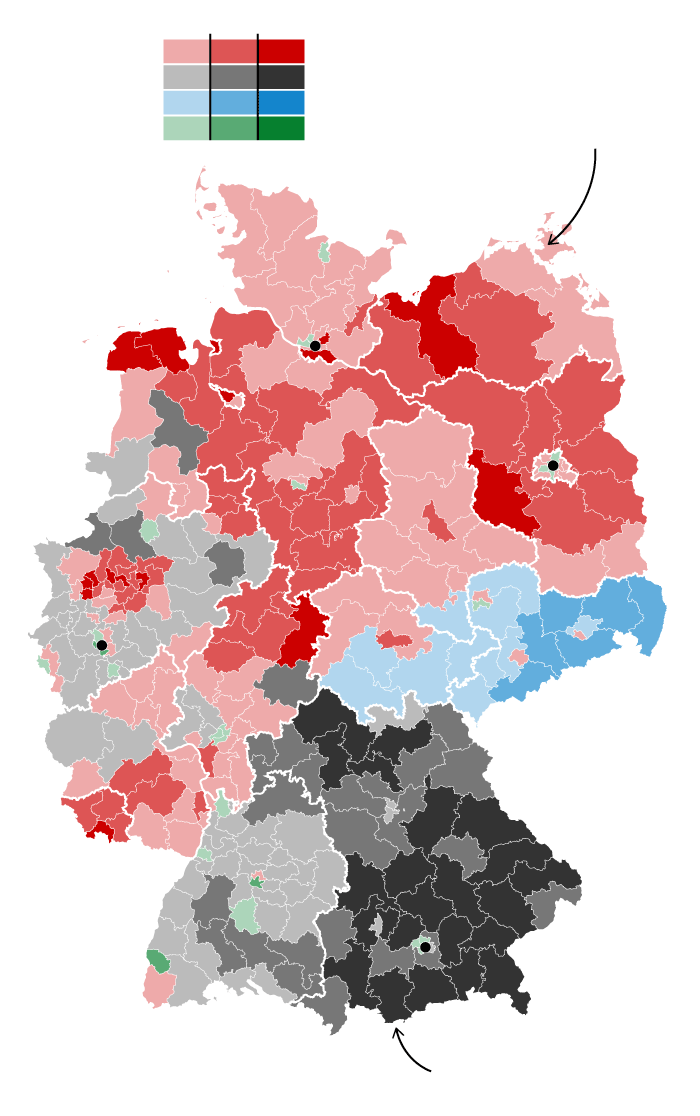German Election: Your Last Opportunity To Make A Difference

Table of Contents
Understanding the German Election System
Germany utilizes a mixed-member proportional representation system, meaning you cast two votes: one for a direct candidate in your constituency (Erststimme) and one for a political party (Zweitstimme). This system ensures both local representation and proportional representation of parties at the federal level.
- Two Votes: Your Erststimme elects a Member of Parliament (Bundestagsabgeordnete) directly from your constituency. Your Zweitstimme determines the overall seat allocation among the parties based on their national vote share.
- Coalition Governments: Because it's rare for a single party to win an outright majority, coalition governments are the norm. Parties negotiate to form a governing coalition after the election, reflecting the proportional representation achieved through the Zweitstimme.
- The Bundespräsident (Federal President): While the Chancellor (Bundeskanzler/Bundeskanzlerin) leads the government, the Bundespräsident is the head of state, primarily playing a ceremonial role but with some significant reserve powers.
- Further Information: For detailed information on the electoral process, visit the official website of the Bundeswahlleiter: [Insert Link Here]
Key Issues Shaping the German Election
This election will be decided on several crucial issues. Understanding the parties' stances on these matters is paramount to making an informed decision.
Climate Change and Environmental Policy
Climate change is a top priority for many German voters. The different parties offer vastly different approaches to tackling this challenge.
- Party Positions:
- Greens (Bündnis 90/Die Grünen): Advocate for ambitious climate targets, rapid expansion of renewable energy, and significant investments in green technologies.
- SPD (Sozialdemokratische Partei Deutschlands): Supports a transition to renewable energy but with a more gradual approach than the Greens.
- CDU/CSU (Christlich Demokratische Union Deutschlands/Christlich-Soziale Union in Bayern): Focus on a balanced approach, combining renewable energy with maintaining existing infrastructure.
- FDP (Freie Demokratische Partei): Emphasizes market-based solutions and technological innovation to address climate change.
- AfD (Alternative für Deutschland): Generally downplays the urgency of climate change and opposes ambitious climate policies.
- Public Opinion: Recent polls show a strong majority of German citizens are concerned about climate change and support ambitious climate action. [Insert relevant statistic link here].
Economic Policy and Social Welfare
Economic policy and social welfare are always central themes in German elections. Differing approaches to taxation, social security, and job creation define the parties' platforms.
- Party Approaches:
- SPD: Typically advocates for stronger social safety nets and higher taxes for high earners.
- CDU/CSU: Usually favors a more market-oriented approach with a focus on fiscal responsibility.
- FDP: Strongly advocates for lower taxes and reduced government regulation.
- Greens: Prioritize social justice and environmental protection, potentially impacting economic policy through investments in green technologies and social programs.
- AfD: Generally supports lower taxes and reduced government spending, often at the expense of social programs.
- Impact on Citizens: These differing policies have significant impacts on different segments of the population, affecting everything from minimum wage to unemployment benefits.
Immigration and Integration
Immigration and integration remain contentious issues in Germany. The parties have significantly differing views on immigration policies and integration programs.
- Party Stances:
- CDU/CSU: Generally supports controlled immigration with a focus on skilled workers.
- SPD: Generally advocates for a more welcoming approach to immigration while emphasizing integration efforts.
- Greens: Tend to support a more liberal immigration policy with a strong emphasis on integration and refugee resettlement.
- FDP: Focuses on immigration based on economic needs and streamlined integration processes.
- AfD: Generally opposes large-scale immigration and advocates for stricter border controls.
- Immigration Statistics: [Insert link to relevant statistics on immigration to Germany] Public opinion on immigration is diverse, with significant variations depending on the specific policy and the respondent's demographics.
How to Register and Vote in the German Election
Voting in the German election is a fundamental right and responsibility. Here's how to participate:
-
Voter Registration: Check your registration status. If you're not registered, deadlines apply; check the local election office ([Insert Link Here]) for details.
-
Casting Your Vote: You'll receive a ballot paper with two sections – one for your Erststimme and one for your Zweitstimme. Mark your choices clearly.
-
Voting Locations: Your polling station will be indicated on your voter registration information. Accessibility options are available; contact your local election office for details.
-
Absentee Voting: If you can’t vote in person, absentee voting options are available. Inquire with your local election office for further details and deadlines.
-
Step-by-Step Guide to Registering: [Insert Link to step-by-step guide]
Conclusion
The German Election is a crucial opportunity to shape the future direction of the country. By understanding the key issues, the electoral system, and the different party platforms, you can make an informed decision and exercise your right to vote. Don't let this opportunity pass you by. Your participation in the German Election is not just a right; it's your responsibility. Make your voice heard – register and vote in the upcoming German Election today! Your vote can make a real difference.

Featured Posts
-
 Rachel Zegler At Snow White Spain Event Gal Gadots Absence Noted
May 14, 2025
Rachel Zegler At Snow White Spain Event Gal Gadots Absence Noted
May 14, 2025 -
 Bazl Tstdyf Ywrwfyjn 2025 Lmht En Almfajat Almntzrt
May 14, 2025
Bazl Tstdyf Ywrwfyjn 2025 Lmht En Almfajat Almntzrt
May 14, 2025 -
 Anne Marie Davids Israel Performance And 2025 Eurovision Praise
May 14, 2025
Anne Marie Davids Israel Performance And 2025 Eurovision Praise
May 14, 2025 -
 Calvin Klein Euphoria Deep Discount At Nordstrom Rack This Week
May 14, 2025
Calvin Klein Euphoria Deep Discount At Nordstrom Rack This Week
May 14, 2025 -
 Peacock Announces Ted Sequel Series With Mark Wahlberg
May 14, 2025
Peacock Announces Ted Sequel Series With Mark Wahlberg
May 14, 2025
